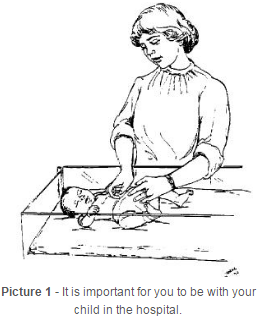Failure to Thrive In Infants
Failure to Thrive (FTT) describes an infant or child who does not gain weight at the expected rate. The two kinds of FTT are organic and non-organic. Medical problems such as diarrhea or vomiting that continue may be the cause of organic FTT. If your child has organic FTT, it could be that he or she is not able to take in nutrients from food or formula. Tests will be done to see if there is a medical problem. Sometimes Failure to Thrive has no medical cause and is called non-organic FTT. Infants with non-organic FTT usually begin to gain weight when changes are made in the way the baby is fed, cared for and nurtured.
Symptoms of Failure to Thrive
Your baby may have some of these symptoms:
- Poor sucking (does not feed well)
- Hard to feed
- Vomiting or diarrhea
- Sleeps too much or not enough
- Fussiness
- Weak cry
- Loses weight or does not gain enough weight
- Stiff or "floppy" muscles
- Slow in growth and development
- May not show interest in things around him
- Does not move around much
- Does not make eye contact when being held
If Your Child Is in the Hospital
Please stay with your child and help in his or her care. It is important for you to be with your child during this time. You can help with care and feeding and play with and talk to your baby (Picture 1). The doctor may need to do more tests to find a medical cause for FTT. These tests may include stool samples and blood tests.
While your child is in the hospital, nurses will keep track of:
- How often and how much your child eats at each feeding
- How much urine, stool and vomiting he may have
- Your child’s weight every morning before the first feeding (without clothes or diaper)
- Your child’s behavior
- How he gets along with caregivers
The dietitian (a person who is trained to give advice about what to eat) will look at the food or liquid your child eats or drinks each day. It is important to know how many calories your child is getting. A feeding schedule may be set up so your child can gain enough weight.
A social worker may visit with you and help to get formula or help to solve other problems. An occupational therapist (a person who is trained to help with your child's development) will visit with you and your child.
Ways to Help at Home
- Follow the home feeding schedule or the diet your child’s doctor has given you for him or her as closely as possible for the first 24 hours. After that, make changes only when suggested by the doctors, nurses and dietitians.
- Hold your baby upright during bottle feedings (a nurse will show you if you need help). Smile and speak softly to your baby (Picture 2).
- Never put your baby to bed and "prop" the bottle because it can lead to choking, tooth cavities and ear infections.
- Feed solid foods from a spoon if the doctors and dietitian tell you to.
- Talk and play with your baby whenever you can. Bath time, feeding time and diaper changes are great times for gentle hugs, talking to your baby and playing peek-a-boo. Your baby will really enjoy this!
- Bonding between you and your baby is very important in his development.
- Be sure to ask your nurse and doctor questions. We want to help you with your child.
When to Call the Doctor
Call your doctor if your child has any of these symptoms at home:
- Decreased appetite (is not eating as much as usual)
- Diarrhea (if bowel movements are always watery)
- Sleepiness
- Vomiting (more than just spitting up a little)
- Weight loss or poor weight gain
Follow-Up Appointment
- Be sure to keep all your appointments with your child's doctor. This is very important.
- We will weigh your child at each visit so you will know if he is growing as he should.
Important Phone Numbers
If you have any questions, be sure to ask the health professional, or call:
Your child's doctor__________________________ phone________________
Your child’s nurse__________________________ phone_________________
Your child’s dietitian_________________________ phone________________
HH-I-147 5/91, Revised 10/15 Copyright 1991, Nationwide Children’s Hospital




